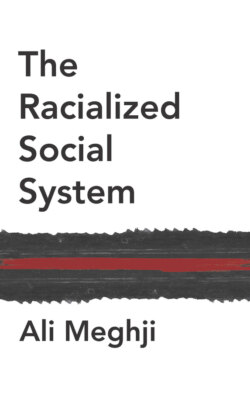Читать книгу The Racialized Social System - Ali Meghji - Страница 12
Why does theory matter?
ОглавлениеOf course, of interest to these social theorists of race was not merely a scholastic curiosity about what makes a theory a theory. Rather, each of these thinkers believed that theory is needed in the sociology of race because it helps us to do something. As Golash-Boza (2016: 129) aptly puts it: ‘the purpose of a critical theory of race and racism is to move forward our understanding of racial and racist dynamics in ways that bring us closer to the eradication of racial oppression’. As summarized here, the purpose of social theorizing is to help us achieve material change – it is not a chin-stroking exercise that one can do in a vacuum away from the empirical world in which one lives. This ethos is well summarized by Stuart Hall (1991: 42) when he claims that ‘theory is always a detour on the way to something more important’; theorizing is an important activity, but this activity should not stop at the act of theorizing itself; it needs to be engaged in lived worlds and social realities. This approach to theorizing, to me, is a clear example of what we mean when we talk about practical social theory.
By calling social theory practical, I mean that ‘theory properly conceived should not be severed from the research work that nourishes it and which it continually guides and structures’ (Bourdieu and Wacquant 1992: 30). Social theories are thus necessarily entangled and interactive with data, description, empirical work and research questions (see Besbris and Khan 2017; Maxwell 1996). This is not to endorse a form of empiricism, whereby social theories are nothing but descriptions of specific case studies from which the theories are unable to generalize or infer. Rather, it is to claim that social theorizing ought not to proceed at the ‘meta’ level, divorced from the social world which is being studied (Bourdieu and Wacquant 1992). Such meta-theorizing simply ‘moves the object of sociology away from embodied life towards the ethnography of ideas’, meaning ‘that a sociologist can have a long and successful career without talking or listening sociologically to anyone beyond the seminar room or conference colloquia’ (Back 2007: 16). Rather, social theorizing ought to be concerned with conjuring up concepts which can be deployed and developed – ‘put on trial’ – in and through empirical research.
A large component of my book is dedicated to showing this fact: that critical race theory is indeed a practical social theory, and therefore offers a useful framework for thinking about the micro, meso and macro dimensions of racism across time and space. However, before I proceed to this discussion there is another important ethical issue that first requires treatment.
At the heart of my claim that CRT is indeed a theory is an issue of epistemic justice. As Patricia Hill Collins (1998) has highlighted, the very definition of ‘social theory’ itself has been produced by many academics who have no vested interest in challenging the racial status quo. However, as Collins (1998: xiii) argues, this does not simply mean that ‘elites produce theory while everyone else produces mere thought’. Rather, what this really shows is that elites ‘possess the power to legitimate the knowledge that they define as theory as being universal, normative, and ideal’ while they ‘derogate the social theory of less powerful groups who may express contrary standpoints on the same social issues by labelling subordinate groups’ social theory as being folk wisdom, raw experience, or common sense’.22 In claiming that CRT is a social theory, therefore, we are opening up the reality that there are multiple different forms of theorizing within the academy that do not fit within the legitimated concept of ‘elite theorizing’, and indeed we are questioning the situation whereby:
racial theory seems to be absent because neither critical racial theory nor intellectuals of color fit comfortably within Western conventions. Privileged white men have long dominated social theory within European and North American intellectual production, enjoying easier access to the epistemic power granted to theorists than African Americans, whose very intellectual abilities remain suspect […] Significantly, intellectuals of color have been denied entry into the academy, with only a select few gaining access to faculty and research positions, and with even fewer obtaining positions as philosophers or social theorists.23
Claiming CRT is a social theory thus enables us to do at least two things. Firstly, it allows us to reconfigure the epistemic devaluation of work centred on ‘race’, showing how theorizing about race contributes to understandings of the social at large. Secondly, it allows us to think of how CRT is a practical social theory in the way that it theorizes ‘about the social in defense of economic and social justice’ (Collins 1998: xiv). This dynamic is captured in the racialized social system approach.
